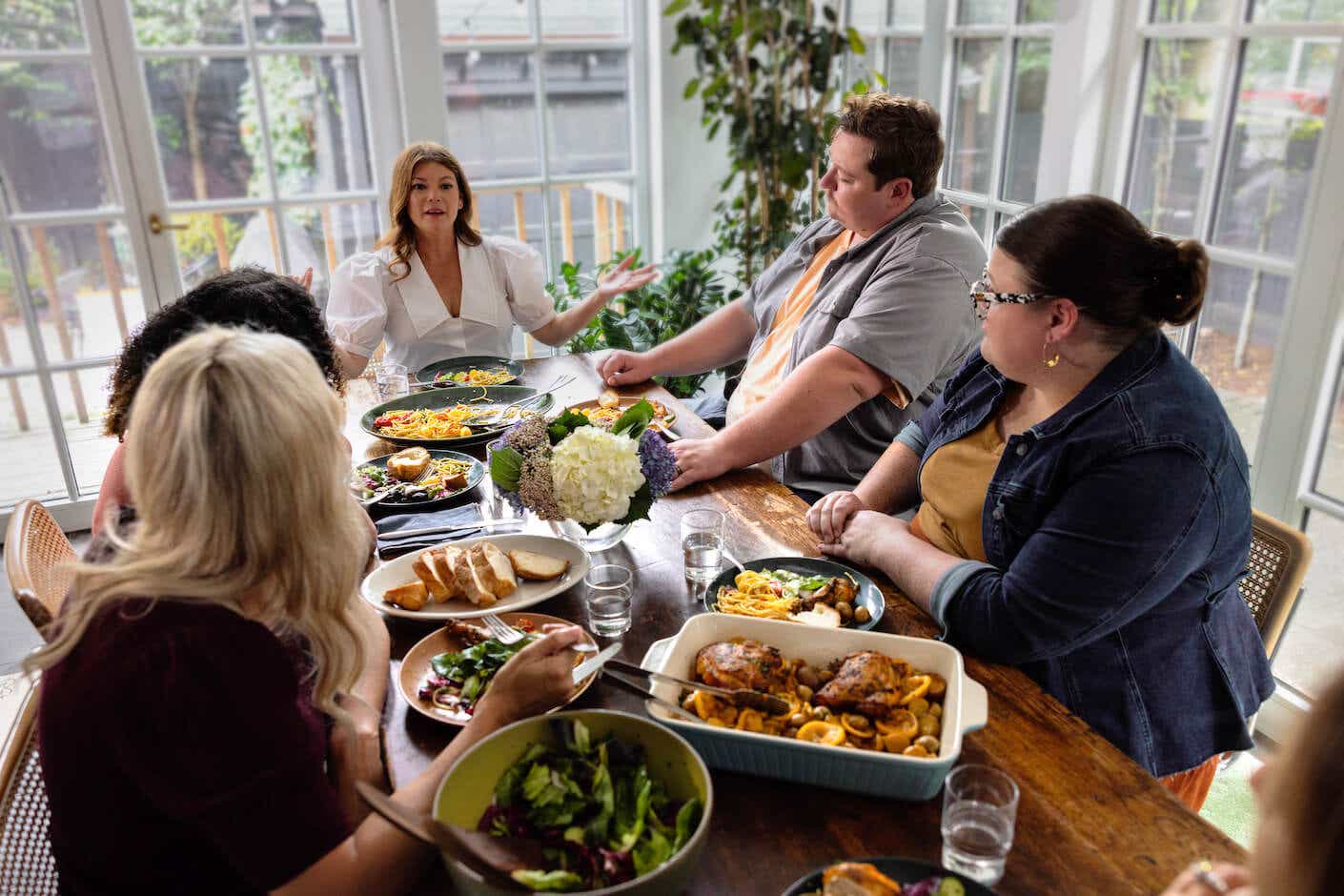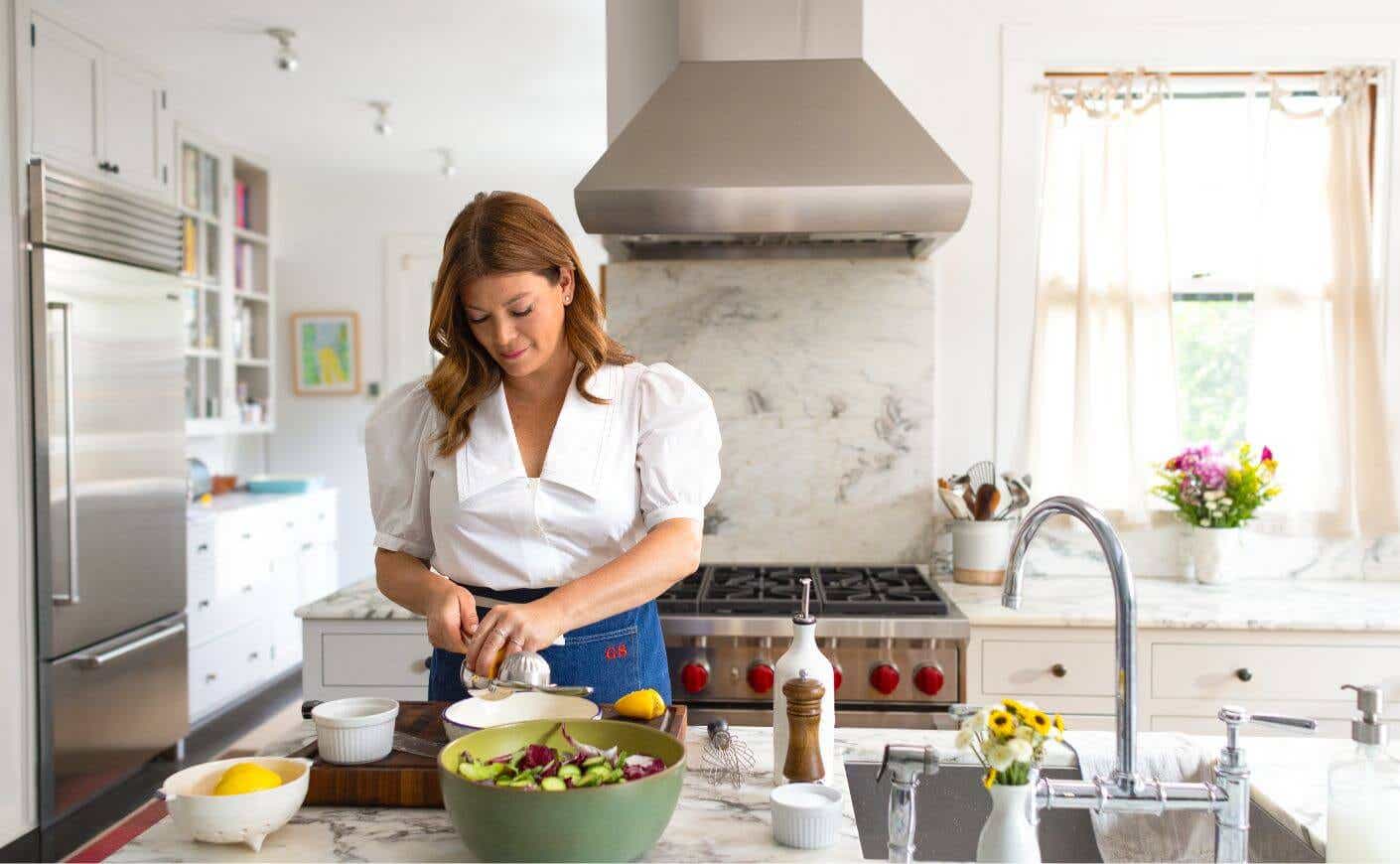For Gail Simmons, the kitchen has always been a place of creativity. When she’s not judging cooks on the Emmy-winning series Top Chef, she’s writing cookbooks stuffed with doable recipes. But Simmons also uses her culinary skills to confront a particularly tough challenge that doesn’t typically involve marinades and whisks. For the first time — on World Mental Health Day — Simmons publicly reflected on her late brother’s schizophrenia diagnosis.
In her partnership with Bristol Myers Squibb’s COBENFY Connections campaign, Simmons is hoping to break stigmas around mental health by turning the kitchen table into a place of advocacy. We spoke with Simmons about her choice to open up about this deeply personal topic, what she hopes to accomplish with this new partnership, and fond memories of sharing meals in her hometown of Toronto with her brother, Alan, who died in 2018. Simmons made it clear to us that she feels food doesn’t just nourish — it connects, heals, and gives us the courage to talk about what matters most.

Katie Couric Media: What inspired you to speak publicly about your brother’s battle with schizophrenia, especially at this stage in your career?
Gail Simmons: My career has always been about bringing people to the table, cooking, and sharing a meal. And schizophrenia is a topic that's always been very personal to me, having had a brother who lived with the condition. I finally found a way to bridge those two things together in a way that felt authentic to me, allowing me to make a big difference. By speaking about my own personal experience, [I hope] that I can help others who might be struggling — either as a person living with the condition or as a care partner — to find the support and the community they need. And in my research, I’ve seen a few instances where people that I admire and respect have talked about it — whether in regard to their own journey, their siblings, or their spouses. It made me realize that if they can talk publicly and make me feel so good, then I have to believe that I can do the same and help other people.
Schizophrenia is a very misunderstood, persistent, and disabling mental health condition. And often it can be very isolating, not only for the person living with the condition, but also for the people who care for them. I've always believed that coming to the table and sharing a meal is at the core of the human condition. It's at the core of humanity.
What’s a specific memory around food that brought comfort or joy during challenging times with your brother?
My brother was diagnosed with schizophrenia in his mid-20s, and I was already 18 or 19 at the time, so it was a very formative part of my early adulthood. My family talked about schizophrenia, and it was a very open thing, always has been. My family, looking back on our childhood, always fostered community around our table. My mom was a cooking instructor, and our kitchen table was the hub, not just of our own family, but of our community. There were always people in our house; our friends were always over. It was a safe space.
The way we shared food was always something that felt very safe and connecting. As my brother was diagnosed with schizophrenia, and it became more challenging to spend time together as a family in the same ways, we all had to reevaluate our relationships a little and support him differently. So those instances of coming together and sharing a meal became even more important. My brother was living in Toronto for the last 25 years of his life. And whenever I would come visit, he loved this one Chinese restaurant in Toronto's Chinatown. My brother was vegetarian for most of his life and vegan for some of it. I have so many memories of going there with him and slurping noodles together. It was a place where he didn't have to explain that he was vegan. This was a long time ago, when it wasn't as easy to get good vegan food; it was just a place that we both loved. And to this day, whenever I drive by or go home and think about that spot, I always associate it with him.
What role do you think the culinary world can play in breaking stigmas around mental health?
Restaurants are hubs of community — both the community they create through their employees and their leadership. If you think about the changing, evolving, and building of community in any neighborhood, you think about the coffee shops, the local restaurants that bring you in, and the feeling you get by going to a great restaurant where you're made to feel at home. To me, that’s how communities are built. That’s why I was always drawn to the restaurant community because at its heart, it’s about nourishing people, feeding people, and making people feel welcome. People can celebrate milestones [at restaurants], but they can also come together in times of grief and fear of the unknown. There are many places in my own community that I feel strongly about because they bring people together. To me, that's such an important piece of the struggle with mental illness, both with the stigmas around it and with finding the right treatment and support.
And I think the restaurant industry has an obligation, in a lot of ways, to be the center of community. Restaurants operate for long hours — evenings, weekends, and holidays — and their employees give so much to make them run smoothly. It's such a hardworking industry. So making sure that those spaces are safe and supportive — not just for the customers, but for the employees too — is a big piece of the puzzle.
How did your partnership with Bristol Myers Squibb for their COBENFY Connections campaign come about, and what message do you hope to share?
The COBENFY Connections campaign with Bristol Myers Squibb came about because of their dedication to the idea that the table can be a safe place for important, honest conversations with caregivers, care partners, and people struggling with mental illness. It felt really natural to be part of that conversation. Obviously, my passion has always been bringing people to the table; my hope is that the table becomes a place where people can check in with each other, no matter where they are or who they're with. Because sometimes just even small daily supports mean the world and can really make a difference.
Through the campaign, I've had an opportunity to sit down, cook a meal, and share a meal with several people who are living with schizophrenia and their care partners. It was actually really remarkable for me to hear other stories. Having that chance really reminded me how similar our experiences are, how universal.
Do you have any practical advice about creating moments of connection for families and friends and supporting someone with schizophrenia?
Moments of connection are in little things, and that's why I always turn to the example of cooking. We're all going to do it three times a day anyway. It’s a small but really powerful way to form connections. It’s also really empowering. I think it gives people purpose and self-worth, and it can be really rewarding as a way to connect with others. I always say I can't imagine ever being in a kitchen and not feeling better by the time I leave.









